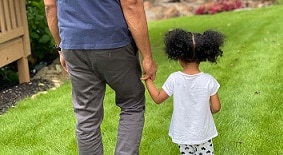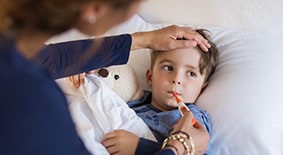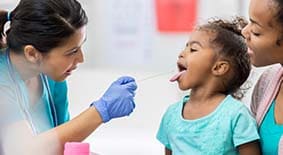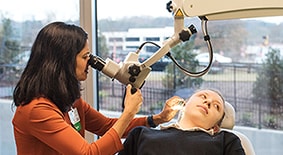Is My Child Too Sick for School?
“Mom, I don’t feel good.”
When this is how kids start their day, it can throw a kink into the morning routine—not to mention send parents into a panic. How serious are those sniffles? Is that cough contagious? Is this stomachache a ploy to play hooky, or should your little one stay home and get some rest?
Here’s what to consider when determining if it’s time to keep your kid home from school.
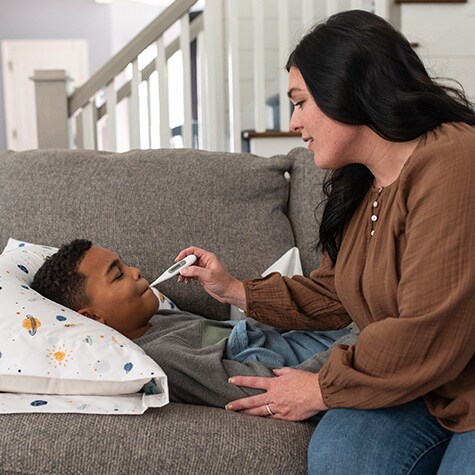
Where to go when your child is sick
If your child is sick or injured, it is important to know where to take them for care. Learn what can be treated at a pediatric urgent care center and a pediatrician's office.
Learn More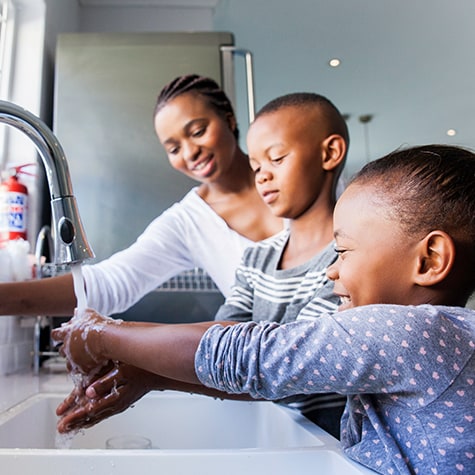
Why, when and how to wash your kids’ hands
Washing your hands throughout the day, and encouraging your kids to do the same, can help stop the spread of germs and prevent illnesses and infections, like colds, the flu and COVID-19.
learn more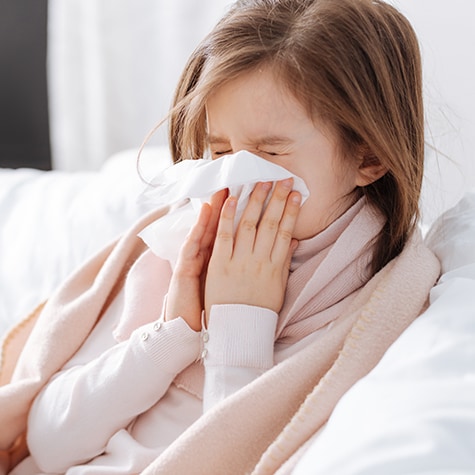
How to spot common illnesses during cold and flu season
Though they have some symptoms in common, here’s how to tell the difference between COVID-19, the flu and the common cold.
learn more“Fevers are often a sign that your child is fighting off a viral or bacterial infection that could be contagious and spread to others,” explained Deirdre Stewart, MD, an area practice director for Children’s Healthcare of Atlanta Urgent Care. “Many schools require children to be fever-free without the use of fever-reducing medicine for at least 24 hours before returning to school.”
Consider keeping your child home if they:
- Have a temperature higher than 100.4°F.
- Are vomiting or have diarrhea.
- Aren't acting like themselves.
- Have other flu-like symptoms, such as chills or body aches.
Call your child's pediatrician immediately if the fever is accompanied by:
- Headache
- Rash
- Stiff neck
- Any trouble breathing
“A sore throat is a common symptom of many different types of illness and can be contagious if it is due to strep throat or a virus. Your child should rest at home if they have a persistent sore throat and see a pediatrician to determine if they need treatment with antibiotics for strep throat or can simply recover from the virus with time and rest," warned Dr. Stewart.
Consider keeping your child home if:
- The sore throat is accompanied by fever, headache, chills or a stomachache.
- Their throat and tonsils are bright red or have white spots on them.
“Stomachaches and abdominal pain can have many causes, and if your child’s pain or discomfort is persistent or keeping them from normal activities, it’s best to contact their pediatrician,” said Dr. Stewart.
Consider keeping your child home if:
- The pain is accompanied by fever, vomiting, diarrhea or a painful sore throat.
- The stomach pain keeps them from participating in regular daily activities.
Dr. Stewart said, “Even though they aren’t always contagious, earaches can be very uncomfortable for a child and may require a trip to the pediatrician.”
Consider keeping your child home if:
- They also have a fever of 100.4°F or higher.
- They act lethargic, fussy or uncomfortable or in a way that’s not like themselves.
- There is discharge coming from the ear.
- They are also experiencing nausea, vomiting, diarrhea or coughing along with ear pain.
“Red, itchy eyes are common symptoms of allergies, which typically shouldn’t keep a child home from school,” advised Dr. Stewart. “However, these can also be symptoms of pink eye, a contagious infection that may require treatment from a doctor. If your child is having eye pain, eye swelling, or acute vision changes, they need to see a doctor.”
Consider keeping your child home if:
- They also have a fever of 100.4°F or higher.
- You see drainage or mucus coming from one or both eyes.
- One or both of their eyes are crusty.
- They are complaining of discomfort in the eye—many kids say it feels like they have sand in their eye.
- One or both eyelids are swollen.
Lice are an unfortunate—but common—part of childhood. Because lice only crawl (they do not jump or fly), they aren’t as contagious as many parents fear. They also don’t spread disease. By the time a child starts itching or shows visible signs of lice, lice have likely been present for at least four weeks.
The current recommendations from the American Academy of Pediatrics and CDC say that children may remain in school until the end of the day once lice are detected. A parent should be notified privately, and treatment should begin as soon as possible. Once treatment has started, the child can return to school.
“In the past, schools often had strict ‘no-nit’ policies, but new recommendations suggest these rules should be abandoned,” said Dr. Stewart. “It’s important to remember that lice can affect anyone and cleanliness has nothing to do with it. There are millions of cases each year.”
Consider keeping your child home if:
- You have not started treatment, but they don’t need to continue to stay home once treatment has started.
- A fever of 100.4°F or higher is present.
At the end of the day, you know your child best. The above are general recommendations that might not apply to your child's circumstances. If they aren’t acting like themselves, or it doesn’t seem like they could participate in school activities, trust your instincts and keep your child at home and consider seeking care. Often, a quick call to the pediatrician can help put your mind at ease, even if your child doesn’t need to be seen.
Helping Your Kids Stay Healthy and Safe
Deirdre Stewart, MD, is a board-certified pediatrician, fellow of the American Academy of Pediatrics, and area practice director at Children’s Healthcare of Atlanta Urgent Care. Dr. Stewart also serves on the Board of Directors for the Society of Pediatric Urgent Care. She received her medical degree from the Medical College of Georgia and completed her residency at Emory University School of Medicine.
This content is general information and is not specific medical advice. Always consult with a doctor or healthcare provider if you have any questions or concerns about the health of a child. In case of an urgent concern or emergency, call 911 or go to the nearest emergency department right away. Some physicians and affiliated healthcare professionals on the Children’s Healthcare of Atlanta team are independent providers and are not our employees.
Contact Us 404-785-KIDS (5437)
